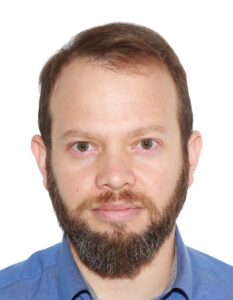Avanish Bharati’s Interview
Starting date: 01.08.2023
Nationality : Indian
Implementing Partner : Jülich Center for Neutron Science
Main supervisor: Prof. Dr. Stephan Förster

Few words about you and your research project
I am a GNeuS postdoc fellow from call n.2 working at the Jülich Center for Neuton Science 1 (JCNS-1) in Forschungszentrum Jülich (FZJ). I have a Chemical Engineering background with a focus on bridging the understanding between molecular interaction and device performance in soft matter materials.
My GNeuS project with Prof. Dr. Stephan Förster is to gain fundamental insights into developing improved solid-state block copolymer electrolytes (SPE) for next-generation lithium-ion batteries. The approach of flattening the charge transport energy landscape with optimal concerted long-ranged charge transfer will enable the design principles for ‘atom-to-cell fabrication’ optimization of super-ionic electrolytes. The project’s findings will be our endeavour toward building sustainable energy for future generations.
The secondment at company Morphys with CEO, Dr. Joachim Loos, will help steer our findings to applications for potential collaboration with companies leading the worldwide market of SPEs.
What is your background? How have you heard about GNeuS?
The research outcomes from my Masters’ completed with First Class and Distinction at the Indian Institute of Science, Bangalore, India, and Ph.D. with Summa cum laude and Congratulations from Jury at KU Leuven in Belgium paved my career in soft matter. My Ph.D. thesis combined rheology, dielectric spectroscopy and rheo-dielectrics to gain insights into multiscale structure-dynamics-properties relationships in compatibilized polymeric materials to improve their electrical and electrochemical properties.
I pursued a postdoc research at the NIST Center for Neutron Research (NCNR) in Maryland, USA, for two years, where I investigated chain end effects on single-chain polymer conformation and developed crystallization-driven self-assembled anisotropic structures in solution. Broadly, I established a correlation between molecular interactions and hierarchical structure using neutron scattering, modelling, and coarse-grained simulation of liquid theories.
Subsequently, I worked briefly on an EU-funded project at the University of Chemistry and Technology, Prague, Czech Republic, as a bridge before GNeuS. The findings helped develop improved crosslinked porous polymer aggregates for effective biocatalyst immobilization.
You can find a complete list of my work here!
I heard about the GNeuS project from a flyer my colleague at NCNR shared.
Why did you apply specifically on GNeuS?
The GNeuS program provides me with an excellent opportunity to work with cutting-edge neutron-based techniques for battery applications at JCNS and its outstations abroad.
The interdisciplinary and intersectoral activities of the GNeuS program give me the necessary facilities, resources, and infrastructure to forge impactful collaborations with scientists with diverse expertise for exploring new research lines, thereby expanding my scientific portfolio.
The secondment and various trainings to be undertaken during the GNeuS program augurs well to acquire and diversify my skills in academic and industrial settings, in a big step towards my professional and personal development.
What impacts do you expect from the GNeuS fellowship?
Within GNeuS, I expect improving the portfolio and sustainability of neutron technologies by developing a fast neutron inelastic scattering analytical technique that will allow tackle the existing challenges and address the industrial needs, such as fast characterization of bulk magnet samples in view of their recycling. Such tasks represent a strategic importance because rare-earth magnets are a critical component of modern technologies (e.g. energy systems, electric and hybrid vehicles, consumer electronics etc.).
The planned activities include participation to conferences in the domain of radioanalytical techniques and accelerator applications, dissemination of the achieved results in peer-reviewed publications, fostering of the Interdisciplinarity and Intersectorality of the research, as well as collaboration with industrial partners. The proposing fast-neutron based technology can be extended to other potential domains, such as homeland security (detection of illicit/dangerous objects in freight cargo) for which fast-neutron based non-destructive analysis techniques represent a promising solution to interrogate voluminous objects and extract an array of qualitative and quantitative information. This pushes forward the neutron-based technology, its applications in various markets and fosters sustainability in neutron science.
